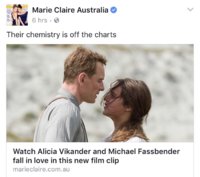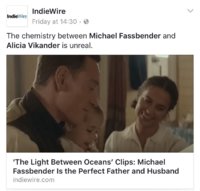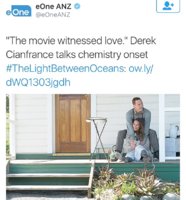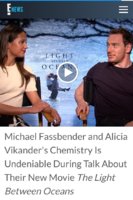Right! Staged or not, Michael always has chemistry with anything or anyone. The one person he doesn't appear to have any chemistry or spark with happens to be his girlfriend. Perhaps it's Alicia's dull personality that isn't allowing for "fun" to show through. Even their candid shots, they are just there.There still is zero chemistry in these shots. Either it is there or it is not. Never mind whether it is a movie promotion or a candid couples' moment. My opinion.
You are using an out of date browser. It may not display this or other websites correctly.
You should upgrade or use an alternative browser.
You should upgrade or use an alternative browser.
Michael Fassbender
- Thread starter Swanky
- Start date
TPF may earn a commission from merchant affiliate
links, including eBay, Amazon, and others
More options
Who Replied?Well none of these screenings can be "premieres" because the rules of the Venice Film Festival are very clear that films in competition there must be world premieres.
If Michael and Alicia were to attend any of them I guess the most likely is NY, but there's been no sightings of them there and they will both be in Venice by Thursday....so perhaps not?
Perhaps not, yeah... I thought they'd confirm.. I don't think they're attending to a premiere before Venice.
After the Venice premiere they're attending to a dinner (+ probable party) for TLBO on sept 1st!
Read it in Italian / Venetian newspapers

Totally disagree with the no chemistry posts. Just my opinion and my observation.
Totally disagree with the no chemistry posts. Just my opinion and my observation.
You are not alone in your observation - I've lost count of the number of people bowled over by Michael and Alicia's chemistry, on screen and off...[emoji173]️[emoji173]️
View attachment 3452778
View attachment 3452779
View attachment 3452780
View attachment 3452781
For those of us who love this couple [emoji7][emoji7]
Well this
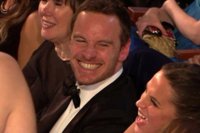

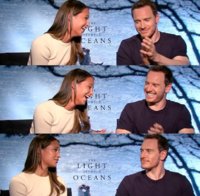
 this is the chemistry I wish I had with him!! [emoji23][emoji7][emoji112][emoji317]
this is the chemistry I wish I had with him!! [emoji23][emoji7][emoji112][emoji317]Great interview. And no mention of the showmance https://t.co/YInyb3m14W
Michael Fassbender on the Long Takes of ‘Light Between Oceans’ and the Scariness of ‘Alien: Covenant’
With writer/director Derek Cianfrance’s (Blue Valentine, The Place Beyond the Pines) The Light Between Oceans opening this weekend, I recently landed an exclusive interview with one of the film’s stars Michael Fassbender. He revealed why he wanted to be part of this project, what it was like collaborating with Cianfrance, how they would sometimes do a take that could run thirty minutes, the difficulty in making these kinds of personal stories, how he likes to prepare for a role, and much more. In addition, with Fassbender producing and starring in Assassin’s Creed, he talked about what people can look forward to with that film and he also teases the scariness of Ridley Scott’s Alien: Covenant.
If you’re not familiar with The Light Between Oceans, it’s a fantastic adaptation of M.L. Stedman’s novel of the same name. The film stars Fassbender and Alicia Vikander as Tom and Isabel Sherbourne, a devoted husband and wife who are faced with the unfortunate reality that they can’t bear a child. When a boat washes up on their local shore with a dead man and a living baby inside, they’re placed in the moral quandary between finally having their wish and doing the right thing (ie turning the baby over to the authorities). Against Tom’s better judgement, they keep and raise the baby, and their decision threatens to tear the couple apart. The film also stars Rachel Weisz.
Unlike a lot of Hollywood movies where they make it easy to say who is good or evil and most decisions are black and white, what I loved about The Light Between Oceans is no person is evil. No one is “bad.” They’re all real people making honest decisions in the moment and the film doesn’t have the typical antagonist. When you combine this kind of intelligent storytelling, fantastic acting, beautiful cinematography, and Derek Cianfrance’s great direction, you’re left with a special film that I hope people turn out to see.
Here’s what Fassbender had to say:
Collider: The last few years you’ve been very fortunate. What it’s been like for you being able to work with these such talented actors, talented filmmakers, and you know, be a part of these great projects?
MICHAEL FASSBENDER: It feels good. As an actor, it’s always been good to be working at all, so to be working with this kind of outburst of talent and people that I’ve been working with, yeah, it’s the best.
Jumping into The Light Between the Oceans, one of the things I love about Derek’s work is that he really goes for the emotional honesty in all scenes. Can you talk a little about working with Derek and what he was looking for on set?
FASSBENDER: I think he’s the sort of director that always pushes to find more in the scene. So even if the scene is barely starting forward – maybe three lines, so we could run a take without cutting for 30 minutes, trying to sort of discover new things all the time. I mean, as one of the notes for us as actors was to fail to surprise him, so he’s definitely one of those directors that’s very much at the forefront of his mind. You know, when you finish the day, and you finish the scene, you don’t get a chance to go back to it. So you wanna make sure that everything is left on the floor.
I would imagine that you had a lot of choices at that time for projects – what was it about the material that spoke to you to be a part of this?
FASSBENDER: I just read the script, and it just fit me and I sort of found a place – an emotional place and I felt that it was a really beautiful story. It seemed like it was a story that a lot of people could relate to: a lot of ordinary, decent people trying to sort out life choices, and making a choice that was a bad one but they’re good people and trying to deal with the consequences of that choice. I felt like it was a pretty refreshing story and told in a respectfully old-fashioned one, and you know, we don’t get much of those touching films these days. There’s not a villain and a good guy, there’s just the family – and they’re regular people trying to sort of do the best they can in these circumstances. It’s a beautiful love story as well.
That’s one of the things I wanted to touch on. One of the really refreshing things was for me, there really was no antagonist. It was just a nice change. For me, looking at it from the outside in Hollywood, it’s harder and harder to make these, you know, personal stories. Have you been noticing that as an actor, that getting a script like this is harder and harder?
FASSBENDER: Absolutely, without question
Well jumping into – one of the things I spoke to Derek yesterday – one of the things that surprised me was that he was editing this for a year, and most filmmakers don’t have that much time to edit. When someone’s editing a project that you’re involved with, how involved do you want to be in the editing room? Or do you sort of say, “just show me when it’s done”?
FASSBENDER: I think I saw a few edits that Derek has done and I make suggestions I felt – there was my notes, for whatever good they will do, and he did make some changes, and when I did give him those notes, and I was very grateful for that. Derek was always like, come to the edit [room] whenever you want, he’s very collaborative like that and he takes everyone’s notes to heart and really digests them. He is a very strong, independent filmmaker, but sort of in his own mind. But also, because he sort of felt comfortable in confident in himself I guess, in lacking ego, he’s also very open to people’s notes and ideas. So I wasn’t in the edit [room] per se with him, but like I said, he would do cut, I would watch it, and I would give him notes on that.
As I’m sure you’ve heard from everyone you speak to, you’re – I’m very impressed with your acting. I’m curious, how you’ve changed over the course of the last few years working on more and more films in the way you get ready for a role. Or do you have a similar routine for everything you do?
FASSBENDER: Yeah, it’s pretty much been the same all the time. I spend a lot of time with the script, and that’s really kind of the core of the separation I just really reread and reread and just spend time with the script and doing so, spending time with the characters and the story and it just sort of seeps into the bone marrow after a while for me. But that’s really, it really boils down to that.
Some actors I’ve spoken with enjoy the Clint Eastwood method of shooting the rehearsal, maybe one or two takes, and others really love the David Fincher method of a lot of takes. What do you like to do, typically?
FASSBENDER: I definitely think the first works best. ‘Cause I do so much homework I’m good to go on the first take, I don’t want to rehearse. I like the element of what’s unpredictable of that first take and nobody knows what’s going to happen, and I’m a big fan of that. But you know, it’s also it’s for sure, but that’s definitely the camp I would be part of.
I got to see about 15 minutes of Assassin’s Creed, and it really looked cool to me. It looked like this could be the video game movie that really breaks out, in terms of doing it right. Have you seen the finished film? What was your takeaway?
FASSBENDER: Well yeah, this is a film that I will be in the edit on, ‘cause I’m producer on it. So, you know, we’re still working on it, we’re still editing away. I’m very excited by the whole universe of Assassin’s Creed. I wasn’t aware of it until I met the guys from Ubisoft. When they started to tell me the premise behind it and the details of these two different warring factions, I just thought it lead to tell perfectly through a cinematic medium. So that was five years ago now, been involved in it from the ground up, so I’m really passionate about it. But you know, I feel like we’ve got definitely something very original and thought-provoking in this kind of genre, and we’re very lucky to get Justin Kurzel on board and Marion Cotillard, from the experience that we had on Macbeth, and with Adam Arkapaw who’s an absolute artist as the DP, so we’re very excited about it.
The footage I saw looked fantastic. I would imagine that right now you are getting scripts, you’re looking at what you want to do next. What are you thinking about for the rest of the year and early next year?
FASSBENDER: Doing nothing. No, I won’t be doing nothing, I won’t be doing any acting. Let’s put it that way, I’ll be just working on the script and development of my production company. We’ve got quite a few things that are sort of in the works. So just spending more time with writers, developing stuff for this next 6-8 months, you know, investing a lot of time in that in making sure that those projects are in good place and I’m looking forward to that actually.
Michael Fassbender on the Long Takes of ‘Light Between Oceans’ and the Scariness of ‘Alien: Covenant’
With writer/director Derek Cianfrance’s (Blue Valentine, The Place Beyond the Pines) The Light Between Oceans opening this weekend, I recently landed an exclusive interview with one of the film’s stars Michael Fassbender. He revealed why he wanted to be part of this project, what it was like collaborating with Cianfrance, how they would sometimes do a take that could run thirty minutes, the difficulty in making these kinds of personal stories, how he likes to prepare for a role, and much more. In addition, with Fassbender producing and starring in Assassin’s Creed, he talked about what people can look forward to with that film and he also teases the scariness of Ridley Scott’s Alien: Covenant.
If you’re not familiar with The Light Between Oceans, it’s a fantastic adaptation of M.L. Stedman’s novel of the same name. The film stars Fassbender and Alicia Vikander as Tom and Isabel Sherbourne, a devoted husband and wife who are faced with the unfortunate reality that they can’t bear a child. When a boat washes up on their local shore with a dead man and a living baby inside, they’re placed in the moral quandary between finally having their wish and doing the right thing (ie turning the baby over to the authorities). Against Tom’s better judgement, they keep and raise the baby, and their decision threatens to tear the couple apart. The film also stars Rachel Weisz.
Unlike a lot of Hollywood movies where they make it easy to say who is good or evil and most decisions are black and white, what I loved about The Light Between Oceans is no person is evil. No one is “bad.” They’re all real people making honest decisions in the moment and the film doesn’t have the typical antagonist. When you combine this kind of intelligent storytelling, fantastic acting, beautiful cinematography, and Derek Cianfrance’s great direction, you’re left with a special film that I hope people turn out to see.
Here’s what Fassbender had to say:
Collider: The last few years you’ve been very fortunate. What it’s been like for you being able to work with these such talented actors, talented filmmakers, and you know, be a part of these great projects?
MICHAEL FASSBENDER: It feels good. As an actor, it’s always been good to be working at all, so to be working with this kind of outburst of talent and people that I’ve been working with, yeah, it’s the best.
Jumping into The Light Between the Oceans, one of the things I love about Derek’s work is that he really goes for the emotional honesty in all scenes. Can you talk a little about working with Derek and what he was looking for on set?
FASSBENDER: I think he’s the sort of director that always pushes to find more in the scene. So even if the scene is barely starting forward – maybe three lines, so we could run a take without cutting for 30 minutes, trying to sort of discover new things all the time. I mean, as one of the notes for us as actors was to fail to surprise him, so he’s definitely one of those directors that’s very much at the forefront of his mind. You know, when you finish the day, and you finish the scene, you don’t get a chance to go back to it. So you wanna make sure that everything is left on the floor.
I would imagine that you had a lot of choices at that time for projects – what was it about the material that spoke to you to be a part of this?
FASSBENDER: I just read the script, and it just fit me and I sort of found a place – an emotional place and I felt that it was a really beautiful story. It seemed like it was a story that a lot of people could relate to: a lot of ordinary, decent people trying to sort out life choices, and making a choice that was a bad one but they’re good people and trying to deal with the consequences of that choice. I felt like it was a pretty refreshing story and told in a respectfully old-fashioned one, and you know, we don’t get much of those touching films these days. There’s not a villain and a good guy, there’s just the family – and they’re regular people trying to sort of do the best they can in these circumstances. It’s a beautiful love story as well.
That’s one of the things I wanted to touch on. One of the really refreshing things was for me, there really was no antagonist. It was just a nice change. For me, looking at it from the outside in Hollywood, it’s harder and harder to make these, you know, personal stories. Have you been noticing that as an actor, that getting a script like this is harder and harder?
FASSBENDER: Absolutely, without question
Well jumping into – one of the things I spoke to Derek yesterday – one of the things that surprised me was that he was editing this for a year, and most filmmakers don’t have that much time to edit. When someone’s editing a project that you’re involved with, how involved do you want to be in the editing room? Or do you sort of say, “just show me when it’s done”?
FASSBENDER: I think I saw a few edits that Derek has done and I make suggestions I felt – there was my notes, for whatever good they will do, and he did make some changes, and when I did give him those notes, and I was very grateful for that. Derek was always like, come to the edit [room] whenever you want, he’s very collaborative like that and he takes everyone’s notes to heart and really digests them. He is a very strong, independent filmmaker, but sort of in his own mind. But also, because he sort of felt comfortable in confident in himself I guess, in lacking ego, he’s also very open to people’s notes and ideas. So I wasn’t in the edit [room] per se with him, but like I said, he would do cut, I would watch it, and I would give him notes on that.
As I’m sure you’ve heard from everyone you speak to, you’re – I’m very impressed with your acting. I’m curious, how you’ve changed over the course of the last few years working on more and more films in the way you get ready for a role. Or do you have a similar routine for everything you do?
FASSBENDER: Yeah, it’s pretty much been the same all the time. I spend a lot of time with the script, and that’s really kind of the core of the separation I just really reread and reread and just spend time with the script and doing so, spending time with the characters and the story and it just sort of seeps into the bone marrow after a while for me. But that’s really, it really boils down to that.
Some actors I’ve spoken with enjoy the Clint Eastwood method of shooting the rehearsal, maybe one or two takes, and others really love the David Fincher method of a lot of takes. What do you like to do, typically?
FASSBENDER: I definitely think the first works best. ‘Cause I do so much homework I’m good to go on the first take, I don’t want to rehearse. I like the element of what’s unpredictable of that first take and nobody knows what’s going to happen, and I’m a big fan of that. But you know, it’s also it’s for sure, but that’s definitely the camp I would be part of.
I got to see about 15 minutes of Assassin’s Creed, and it really looked cool to me. It looked like this could be the video game movie that really breaks out, in terms of doing it right. Have you seen the finished film? What was your takeaway?
FASSBENDER: Well yeah, this is a film that I will be in the edit on, ‘cause I’m producer on it. So, you know, we’re still working on it, we’re still editing away. I’m very excited by the whole universe of Assassin’s Creed. I wasn’t aware of it until I met the guys from Ubisoft. When they started to tell me the premise behind it and the details of these two different warring factions, I just thought it lead to tell perfectly through a cinematic medium. So that was five years ago now, been involved in it from the ground up, so I’m really passionate about it. But you know, I feel like we’ve got definitely something very original and thought-provoking in this kind of genre, and we’re very lucky to get Justin Kurzel on board and Marion Cotillard, from the experience that we had on Macbeth, and with Adam Arkapaw who’s an absolute artist as the DP, so we’re very excited about it.
The footage I saw looked fantastic. I would imagine that right now you are getting scripts, you’re looking at what you want to do next. What are you thinking about for the rest of the year and early next year?
FASSBENDER: Doing nothing. No, I won’t be doing nothing, I won’t be doing any acting. Let’s put it that way, I’ll be just working on the script and development of my production company. We’ve got quite a few things that are sort of in the works. So just spending more time with writers, developing stuff for this next 6-8 months, you know, investing a lot of time in that in making sure that those projects are in good place and I’m looking forward to that actually.
You are not alone in your observation - I've lost count of the number of people bowled over by Michael and Alicia's chemistry, on screen and off...[emoji173]️[emoji173]️
Personally I don't care about people's opinion. People believe what it's convenient to believe for certain narrative lines I personally don't follow and I couldn't care less about this whole thing. [emoji23][emoji112][emoji112]
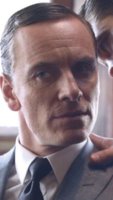
This is not one of my favourite photoshoots but this shot was classy and cool.
My last thing for you – ‘cause I know I’m almost out of time: I am a fan of Prometheus and I love Ridley Scott when he’s doing sci-fi – so excited about the next Alien movie. What can you tease people about it, and what was it like working with Ridley again on the project?
FASSBENDER: I just love Ridley. You know, he’s become a really good friend, and he’s just a natural, he’s one of a kind. Anybody that works with him in any department is just, you know, totally blown away by him. He’s such a visionary and I think he has such a great, understanding of storytelling. You know, coming from an art background, how referring to something being put in the frame, working with the art department, working with costume design, working with the actors, he’s very vigilant and fun, you know? We have a lot of fun, we laugh a lot, and he’s also got very intelligent but also off-center notes. He would never tell you directly to do something, but just give you little flavors. In the first Prometheus, he just sort of walked over, and he’s like “I imagine David’s like a butler so he runs his finger over the desktop checking for dust.” And that was enough for me to go off and explore elements of the character with that in mind. We work really well together. I have to say, this Alien is going to be – I’m really excited to see it and everybody in the film was saying that there’s a film that we all wanna see, it’s much scarier than Prometheus, but it’s got that sort of same scope as Prometheus, that eminent sort of disaster feel, that Alien had. So it’s kind of a beautiful meeting of both of those films. I’m really excited to see it, I think it’s gonna be super scary, number one. And again, with the massive scope of Prometheus.
Dude, that’s the greatest description I could’ve gotten for you saying that it’s gonna be scary. I love hearing that.
FASSBENDER: Yeah, you know once it starts and the ball starts rolling, it’s definitely going to bring chills to the cinema.
I love that. I gotta go, but I heard rumblings that you might be directing at some point. When you’re developing stuff right now with your production company, is that one of the things you’re trying to develop is something you might direct?
FASSBENDER: It’s definitely something that I’m interested in doing and would like to do it at some point. I have no idea when or what yet, because I’m focusing on the development side of things, but yeah. I would like to try it and hopefully not fall flat on my face. But I’m definitely trying to soak up from the best that I’ve been lucky enough to work with, so yeah, I’d like to try it one day.
FASSBENDER: I just love Ridley. You know, he’s become a really good friend, and he’s just a natural, he’s one of a kind. Anybody that works with him in any department is just, you know, totally blown away by him. He’s such a visionary and I think he has such a great, understanding of storytelling. You know, coming from an art background, how referring to something being put in the frame, working with the art department, working with costume design, working with the actors, he’s very vigilant and fun, you know? We have a lot of fun, we laugh a lot, and he’s also got very intelligent but also off-center notes. He would never tell you directly to do something, but just give you little flavors. In the first Prometheus, he just sort of walked over, and he’s like “I imagine David’s like a butler so he runs his finger over the desktop checking for dust.” And that was enough for me to go off and explore elements of the character with that in mind. We work really well together. I have to say, this Alien is going to be – I’m really excited to see it and everybody in the film was saying that there’s a film that we all wanna see, it’s much scarier than Prometheus, but it’s got that sort of same scope as Prometheus, that eminent sort of disaster feel, that Alien had. So it’s kind of a beautiful meeting of both of those films. I’m really excited to see it, I think it’s gonna be super scary, number one. And again, with the massive scope of Prometheus.
Dude, that’s the greatest description I could’ve gotten for you saying that it’s gonna be scary. I love hearing that.
FASSBENDER: Yeah, you know once it starts and the ball starts rolling, it’s definitely going to bring chills to the cinema.
I love that. I gotta go, but I heard rumblings that you might be directing at some point. When you’re developing stuff right now with your production company, is that one of the things you’re trying to develop is something you might direct?
FASSBENDER: It’s definitely something that I’m interested in doing and would like to do it at some point. I have no idea when or what yet, because I’m focusing on the development side of things, but yeah. I would like to try it and hopefully not fall flat on my face. But I’m definitely trying to soak up from the best that I’ve been lucky enough to work with, so yeah, I’d like to try it one day.
Thanks Fassbenderlover, great interview. Looking forward to Alien Covenant. Too bad its a year away! I was one of the few people that enjoyed prometheus.
http://collider.com/michael-fassben...utm_campaign=collidersocial&utm_medium=social cool interview and review of TLBO by Steven Weintraub!!
The coolest thing is that Michael thinks he wants to direct someday [emoji1316][emoji57] I'm looking forward to this.
The coolest thing is that Michael thinks he wants to direct someday [emoji1316][emoji57] I'm looking forward to this.
http://mobile.reuters.com/video/201...ideoRSS&feedName=Entertainment&videoChannel=3 the video is not that interesting always the same story but the Michael and Alicia's short pieces of interview are nice and new to us. It's about what whey would do if they were in Tom and Isabel's situation and their meeting etc. Really short. But nice. 

Register on TPF! This sidebar then disappears and there are less ads!

